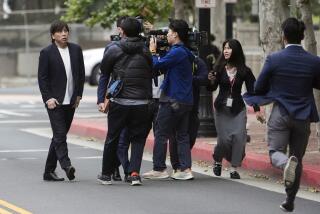Jefferies Pleads Guilty to Federal Felony Charges : Admits Boesky Dealings; 3 Others Deny Wrongdoing
- Share via
NEW YORK — Prominent Los Angeles stockbroker Boyd L. Jefferies pleaded guilty Thursday to two federal felony counts, including one charging that he helped stock speculator Ivan F. Boesky break securities laws.
Jefferies had disclosed March 19 that he had agreed to plead guilty to the dual counts, to resign the chairmanship of the brokerage he founded and to accept a ban from the securities industry for at least five years.
Speaking in monosyllables, Jefferies quietly assented to the charges as they were read aloud by Assistant U.S. Atty. Anne Ryan during his appearance here Thursday morning before U.S. District Judge Morris E. Lasker. His sentencing was scheduled for June 5, although Ryan indicated that it might be delayed.
Jefferies, who specialized in trading stocks on a large scale for institutional clients, faces a fine of $250,000 and a jail term of five years on each of the two charges. He is not charged with trading on inside information.
Jefferies entered his guilty pleas shortly after three other Wall Street figures implicated in the Boesky scandal pleaded innocent to the charges against them. The three are Robert M. Freeman, 44, the head arbitrageur at the firm of Goldman, Sachs & Co.; Richard B. Wigton, 52, the head of risk arbitrage at the firm of Kidder, Peabody & Co., and Timothy L. Tabor, 33, a former Kidder trader. Trial dates will be set later by U.S. District Judge Louis Stanton, who will preside.
All three were implicated by Martin A. Siegel, a former Kidder executive who has already pleaded guilty to trading inside information with Boesky, who himself settled similar charges by paying $100 million in fines and penalties and agreeing to plead guilty to a single felony count.
Siegel has told federal prosecutors that he swapped inside information with Freeman on impending merger deals at each other’s firms and that Wigton and Tabor handled the illicit trading at Kidder. All three have maintained their innocence and suggested that they will defend themselves at trial by challenging Siegel’s credibility.
In Jefferies’ case, the Securities and Exchange Commission and federal prosecutors charged that he had helped Boesky accumulate secret hoards of stocks in several takeover candidates by allowing Boesky to “park” the shares in accounts at Jefferies & Co., the firm Jefferies founded 25 years ago.
In “parking,” one trader buys shares from another on the understanding that they will be repurchased at a later date. The maneuver is illegal to the extent that it allows a participant to avoid disclosing share accumulations of 5% or more of a corporation or allows a firm to appear to maintain minimum net worth levels, as required by the SEC.
Government authorities allege that Boesky violated securities laws in both particulars.
Jefferies also pleaded guilty to one criminal count of violating federal margin rules, which prohibit brokers from buying securities for clients without demanding payment for them. In this case, Jefferies admitted to trading the stock of a company that was the subject of a coming public offering. The trading was designed to support the stock’s price.
Although prosecutors have not identified the company in question, sources say it was Fireman’s Fund, which was the subject of a 1985 offering by its parent, American Express Corp.
More to Read
Inside the business of entertainment
The Wide Shot brings you news, analysis and insights on everything from streaming wars to production — and what it all means for the future.
You may occasionally receive promotional content from the Los Angeles Times.










